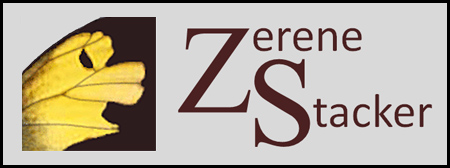Differences
This shows you the differences between two versions of the page.
| Both sides previous revision Previous revision Next revision | Previous revision Last revision Both sides next revision | ||
|
stacker:docs:options:preferences:imagesaving [2020/04/18 18:37] rjlittlefield slight wording change to facilitate searching |
stacker:docs:options:preferences:imagesaving [2022/03/20 16:01] rjlittlefield |
||
|---|---|---|---|
| Line 13: | Line 13: | ||
| The option to "Retain full dynamic range" controls how PMax outputs are saved. The default, with __no__ checkmark on "Retain full dynamic range", is to save files as they appear on screen. This preserves whatever contrast and brightness the PMax method naturally produces, but it may cause unwanted clipping at black and white if the source files reach near those limits and PMax's intrinsic contrast enhancement pushes them past the limits. Placing a checkmark on "Retain full dynamic range" causes the image's brightness and contrast to be adjusted if necessary to assure that no information is lost by clipping. The resulting image is likely to appear washed out, in which case it will require further levels or curves adjustment to restore whatever appearance you prefer. To get the best results, files saved with "Retain full dynamic range" should be formatted as 16-bit TIFF so that adjustments can be made without introducing posterization artifacts. | The option to "Retain full dynamic range" controls how PMax outputs are saved. The default, with __no__ checkmark on "Retain full dynamic range", is to save files as they appear on screen. This preserves whatever contrast and brightness the PMax method naturally produces, but it may cause unwanted clipping at black and white if the source files reach near those limits and PMax's intrinsic contrast enhancement pushes them past the limits. Placing a checkmark on "Retain full dynamic range" causes the image's brightness and contrast to be adjusted if necessary to assure that no information is lost by clipping. The resulting image is likely to appear washed out, in which case it will require further levels or curves adjustment to restore whatever appearance you prefer. To get the best results, files saved with "Retain full dynamic range" should be formatted as 16-bit TIFF so that adjustments can be made without introducing posterization artifacts. | ||
| - | The bottom section, titled **Output Image Names**, provides a template that controls how Zerene Stacker names output images as they are generated. | + | The bottom section, titled **Output Image Names**, provides a template that controls how Zerene Stacker names output images as they are created and placed into the Output Images list. |
| By default, the output naming template is set to "{datetime} ZS {method}", which produces names like "2011-04-23-15.37.40 ZS PMax". However, you can redefine the template to use any combination of certain //{tagnames}// surrounded by curly braces, as follows. | By default, the output naming template is set to "{datetime} ZS {method}", which produces names like "2011-04-23-15.37.40 ZS PMax". However, you can redefine the template to use any combination of certain //{tagnames}// surrounded by curly braces, as follows. | ||
| Line 19: | Line 19: | ||
| **Note:** To work properly, the tagnames must be surrounded by curly braces {} and not by ordinary parentheses (). These characters look very much alike in certain fonts, so be sure to type carefully. | **Note:** To work properly, the tagnames must be surrounded by curly braces {} and not by ordinary parentheses (). These characters look very much alike in certain fonts, so be sure to type carefully. | ||
| - | * //{datetime}// date and time (in fixed format: YYYY-MM-DD-hh.mm.ss) | + | * //{datetime}// date and time (in fixed format: YYYY-MM-dd-hh.mm.ss) |
| + | * //{datetime://format//}// date and/or time in variable format, as described [[https://docs.oracle.com/javase/7/docs/api/java/text/SimpleDateFormat.html|HERE]]. For example the default {datetime} tag is equivalent to {datetime:YYYY-MM-dd-hh.mm.ss} | ||
| * //{method}// either "PMax" or "DMap" | * //{method}// either "PMax" or "DMap" | ||
| Line 30: | Line 32: | ||
| * //{sourcefolder}// name of the folder that contains the first image in the Input Files list, when the stacking operation is completed. | * //{sourcefolder}// name of the folder that contains the first image in the Input Files list, when the stacking operation is completed. | ||
| + | |||
| + | * //{fntodot}// file name of first file selected, to first dot | ||
| * //{estrad}// estimation radius, for DMap only | * //{estrad}// estimation radius, for DMap only | ||
| Line 60: | Line 64: | ||
| * //{FSF}// Frame Skip Factor, from "Stack every N'th frame". | * //{FSF}// Frame Skip Factor, from "Stack every N'th frame". | ||
| * //{FSFlab}// equivalent to ",FSF=<value>" if "Stack every N'th frame" is selected, but nothing otherwise. | * //{FSFlab}// equivalent to ",FSF=<value>" if "Stack every N'th frame" is selected, but nothing otherwise. | ||
| + | |||
| + | * //{numinp}// number of input files selected for the stacking operation | ||
| Examples: | Examples: | ||
